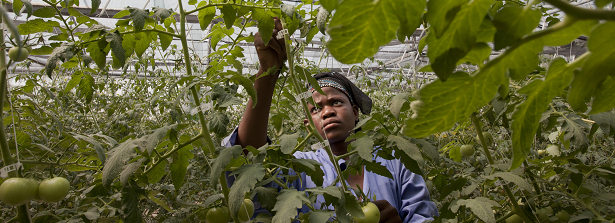Ministries discuss Fruits and Vegetables Sector potential

Late September 2015, an internal discussion meeting took place with about 20 representatives of the Ministries of Foreign Affairs and Economic Affairs and a few related institutions, about the findings of the LEI Wageningen UR report on the potential of the Fruits and Vegetables Sector for Food and Nutrition Security. After a presentation of the report by Frank Joosten (LEI Wageningen UR/Advance Consulting), representatives of the Ministries discussed what the policy implications of the report could be and whether they saw particular knowledge questions for further work.
This short article summarizes the headlines of the meeting.
Business models in the fruits and vegetables sector (‘profit’)
- The typology of value chains depicted in the LEI Wageningen UR report (type A, B, C) is useful and can serve to clarify linkages with food security at country level. Cross-fertilisation between the types is desirable, with specific attention for support to ‘type B’ chains.
- More collaboration is needed between actors in horticultural value chains: a further meeting is proposed between Ministries of Economic Affairs and Foreign Affairs and the TopSector Horticulture & Starting Materials to explore the potential of a horticultural platform.
- Further using and deepening the existing knowledge about the production and marketing of Fruits and Vegetables is advisable, in collaboration with the private sector.
- Knowledge question: what are the ‘drivers of change’ in horticultural value chains, in relation to food security? As follow up to this study, it would be interesting to do a specific analysis in a few regions or countries. This would provide a basis for further policy choices.
Nutrition security effects of fruits and vegetables interventions (‘people’)
- The report is positive about the nutrition security potential of the horticultural sector, though often too positive as the conclusions are partly based on assumptions that are premature: e.g. income increases have a positive effect on FNS indeed, but this is only a small effect; and e.g. the comparison with other sectors.
- More research is needed to develop policy and practical approaches through which the Fruits and Vegetables sector contributes to combating malnutrition, particularly at local level. This research should be linked to (pilot) projects in which combating malnutrition is integrated in the objectives; the latter should be facilitated by the appropriate policy instruments.
- It is needed to specify further which consumer groups are targeted by interventions. Which markets are interventions oriented towards, and do interventions reach vulnerable consumer groups affected by malnutrition?
- Horticultural sector knowledge agenda: learn from lessons from other sectors (dairy, crash crops) and join forces in order to achieve a maximum impact on nutrition security. This report may be of use for these other sectors. Projects that link agricultural sectors with nutrition security are rather new, and their monitoring is important to further strengthen links between practice and policy.
Theories of Change used in fruits and vegetables interventions (‘impact’)
- The report stresses the importance of looking both at the producers’ and the consumers’ perspective. An indicator for successful investment in the Fruits and Vegetables Sector would be a lower consumer expenditure level for a healthy diet.
- Results monitoring and new investments should include indicators dealing with several parallel dimensions: Food and Nutrition Security; business case; the role of the Netherlands.
- Knowledge question: further comparative case studies need to be done addressing the above parallel dimensions. Preferably case studies that go further than the current (Dutch) programme portfolio.
- A chain perspective: a business case needs to be interesting for all actors and offer opportunities for linkages between actors. This should be part of the Theory of Change used in this sector.
A full report of the meeting (in Dutch) is available upon request ().
The Food & Business Knowledge Platform Office is in touch with both Ministries and other stakeholders to plan next steps of this knowledge agenda including how to follow up to the idea to develop pilot studies.






